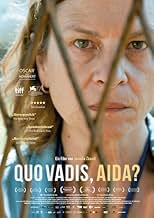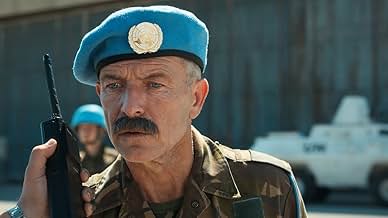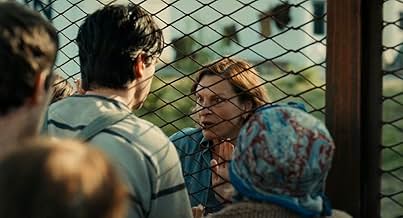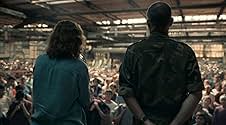IMDb RATING
8.0/10
41K
YOUR RATING
Aida is a translator for the UN in the small town of Srebrenica. When the Serbian army takes over the town, her family is among the thousands of citizens looking for shelter in the UN camp.Aida is a translator for the UN in the small town of Srebrenica. When the Serbian army takes over the town, her family is among the thousands of citizens looking for shelter in the UN camp.Aida is a translator for the UN in the small town of Srebrenica. When the Serbian army takes over the town, her family is among the thousands of citizens looking for shelter in the UN camp.
- Director
- Writers
- Stars
- Nominated for 1 Oscar
- 40 wins & 42 nominations total
- Director
- Writers
- All cast & crew
- Production, box office & more at IMDbPro
Summary
Reviewers say 'Quo Vadis, Aida?' is a powerful, harrowing film about the Srebrenica massacre, praised for impactful storytelling and strong performances, especially Jasna Duricic as Aida. It critically examines the United Nations' failure and explores themes of war and survival. While lauded for emotional depth and historical significance, some criticize perceived inaccuracies and over-dramatization. It is considered an important, though challenging, film that highlights a significant historical event.
Featured reviews
So horrible so horrible...
A war movie about the Srebrenica massacre in 1995. A mother, who's also an interpreter, tried to get her family to safety while the civilians were being transported by the Serbian force.
Coming in, I didn't know anything about the real life story. However, after watching about 10 to 15 minutes, it was abundantly clear what was going to happen. For the rest of the movie, it became a desperate, maddening, and heartbreaking descend into the inevitable. This was shown through the lens of our main character, and her desperation was relatable, like if you were in her shoes you would do everything she did.
The color and cinematography also heightened the desperation. The movie looked monotonous. The overwhelming color of the ground during the day felt hot, dry, and reflected the dire situation the civilians were in. Even more, the movie felt so raw, making me feel like I'm actually there with the people.
And then the ending hit. I knew it was coming, but still I was in silence as the camera slowly moved away. There's no need for showing actual violence. Just the sound was enough to convey the horror. The last scene was a strong testament of the director about the unjust event.
Overall, a devastating movie that i would not want to see again. 9/10.
A war movie about the Srebrenica massacre in 1995. A mother, who's also an interpreter, tried to get her family to safety while the civilians were being transported by the Serbian force.
Coming in, I didn't know anything about the real life story. However, after watching about 10 to 15 minutes, it was abundantly clear what was going to happen. For the rest of the movie, it became a desperate, maddening, and heartbreaking descend into the inevitable. This was shown through the lens of our main character, and her desperation was relatable, like if you were in her shoes you would do everything she did.
The color and cinematography also heightened the desperation. The movie looked monotonous. The overwhelming color of the ground during the day felt hot, dry, and reflected the dire situation the civilians were in. Even more, the movie felt so raw, making me feel like I'm actually there with the people.
And then the ending hit. I knew it was coming, but still I was in silence as the camera slowly moved away. There's no need for showing actual violence. Just the sound was enough to convey the horror. The last scene was a strong testament of the director about the unjust event.
Overall, a devastating movie that i would not want to see again. 9/10.
The Bosnian entry for the Best International Feature Academy Award, "Quo Vadis, Aida?" is better than the odds-on favorite to actually win the Oscar, "Druk" (a.ka. "Another Round," 2020), being that it's actually about something that matters and is emotionally devastating--so much so that the eponymous Aida literally begs to make a Sophie's Choice at one point. The protagonists in both are teachers, and neither one ultimately affects any real change, but one is living history while the other rambles to high-schoolers about his famous favorite fellow drunkards. Both pictures are alienating: this one forcing us to witness the horrific Srebrenica massacre that we're unable to alter, and the other makes one feel like the designated driver to a bunch of binge-drinking dolts whining about their so-called mid-life crises. As opposed to waiting impatiently to drive the inebriated teachers home, however, "Quo Vadis, Aida?" does well to pull the spectator into the chaos. There's nary a dull moment in following Aida (as played rivetingly well by Jasna Duricic--seriously, Academy, you missed a nominee) around a makeshift UN refugee camp as she frantically tries to save the lives of her husband and two sons from the approaching slaughter by Ratko Mladic's Bosnian Serb Army and as the United Nations and their so-called, shorts-wearing peace keepers impotently stand by and refuse to help.
I want to note, too, that Aida being a translator, or interpreter, as the case may be (that "piano player" as "messenger" part early on, e.g.), makes for an interesting dynamic in the subtitling of the picture, among other things--much of it disregarded as unnecessary because of it. There's actually a good deal of English here beside other languages. Another good reason for the Oscar category name change from "Foreign Language Film" to "International Feature."
Additionally, amid all that, writer-director Jasmila Zbanic and company also do something reflexively interesting cinematically. While the real war is nothing more than a one-sided genocide slaughtering Bosniak Muslim males, there's another battle here for the cinematic control of the narrative. On one side, there's Mladic with the cameraman he continually tells what to shoot, and who in return reassures the would-be convicted war criminal that he'll fix his inane monotony with montage. We never see that film here, though--only its making from the outside, where its propagandistic lies are all the more apparent. And, on the other side, we have the faces of the people in the outer, film proper that is "Quo Vadis, Aida?" We see this in intermittent series of return gazes--of people looking directly, or close to, at the camera and, thus, us, the audience. They're the victims of the genocide within the narrative and, as the case may be, interpreting the real tragedy onto the screen, but through these return gazes, seize control of the narrative. This is their movie.
I want to note, too, that Aida being a translator, or interpreter, as the case may be (that "piano player" as "messenger" part early on, e.g.), makes for an interesting dynamic in the subtitling of the picture, among other things--much of it disregarded as unnecessary because of it. There's actually a good deal of English here beside other languages. Another good reason for the Oscar category name change from "Foreign Language Film" to "International Feature."
Additionally, amid all that, writer-director Jasmila Zbanic and company also do something reflexively interesting cinematically. While the real war is nothing more than a one-sided genocide slaughtering Bosniak Muslim males, there's another battle here for the cinematic control of the narrative. On one side, there's Mladic with the cameraman he continually tells what to shoot, and who in return reassures the would-be convicted war criminal that he'll fix his inane monotony with montage. We never see that film here, though--only its making from the outside, where its propagandistic lies are all the more apparent. And, on the other side, we have the faces of the people in the outer, film proper that is "Quo Vadis, Aida?" We see this in intermittent series of return gazes--of people looking directly, or close to, at the camera and, thus, us, the audience. They're the victims of the genocide within the narrative and, as the case may be, interpreting the real tragedy onto the screen, but through these return gazes, seize control of the narrative. This is their movie.
... because you never learn! The despicable, diabolical and disgusting events from Srebrenica, replayed many times before, currently playing out in several countries now, and quite probably for the foreseeable future while we continue to turn a blind eye, ignore, disengage or perhaps don't care. Jasna Djuricic as Aida, immense!
The film covers the topic on Srebrenica genocide, which was committed in 1995 in Bosnia. It is portrayed through a family story, with Aida, a translator for the UN, as the main character.
A sad, but an important lecture on what hatred can make people do.
This is about events around the Srebrenica massacre in 1995. The UN promised that this would be a safe zone, but doesn't back up its ultimatums with action, leaving the small contingent of UN peacekeepers helpless in the face of stronger Serbian forces, who step-by-step get bolder, take over the town, and eventually the civilians seeking safety at the UN base.
I saw this as a digital screening of the Toronto International Film Festival, with writer / director Q+A. The writer put together the story based on actual transcripts, together with survivor stories. Many were composited into the main character Aida. Aida is a translator for the UN troops, and she also tries to keep safe her husband and 2 teenaged sons,. Thus she could move between the "defenders" and the defended, and tell the stories of both.
The characters are well-played and believable, and there are little touches that are illuminating: some flashbacks to pre-war life, a reference to neighbors turning against neighbors, etc. My one complaint is that, as a composite, some events seem to happen too quickly.
I saw this as a digital screening of the Toronto International Film Festival, with writer / director Q+A. The writer put together the story based on actual transcripts, together with survivor stories. Many were composited into the main character Aida. Aida is a translator for the UN troops, and she also tries to keep safe her husband and 2 teenaged sons,. Thus she could move between the "defenders" and the defended, and tell the stories of both.
The characters are well-played and believable, and there are little touches that are illuminating: some flashbacks to pre-war life, a reference to neighbors turning against neighbors, etc. My one complaint is that, as a composite, some events seem to happen too quickly.
Did you know
- TriviaJasna Djuricic, who plays the main role, is the wife of Boris Isakovic, who plays general Mladic. They often work together in film and theater, but in this film they don't share any scenes.
- Quotes
Aida Selmanagic: We are on the list!
- ConnectionsFeatured in La 93e cérémonie des Oscars (2021)
Details
- Release date
- Countries of origin
- Official sites
- Languages
- Also known as
- Quo Vadis, Aida?
- Filming locations
- Production companies
- See more company credits at IMDbPro
Box office
- Budget
- €4,500,000 (estimated)
- Gross worldwide
- $813,253
- Runtime
- 1h 41m(101 min)
- Color
- Sound mix
- Aspect ratio
- 1.85 : 1
Contribute to this page
Suggest an edit or add missing content


![Trailer [OV]](https://m.media-amazon.com/images/M/MV5BNjFiN2EzNDItMzBiNy00YjI4LTkwM2YtN2YxYzcwYmYzYjIxXkEyXkFqcGdeQXRyYW5zY29kZS13b3JrZmxvdw@@._V1_QL75_UX500_CR0)
































